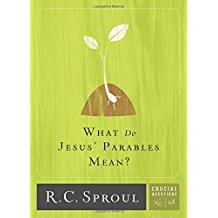First sentence: Our Lord Jesus Christ was the greatest teacher who ever walked on the face of the earth. Not only was He the very incarnation of truth--and so the content of His teaching was impeccable and of divine origin--but He was also a master pedagogue. That is, His style of teaching was extraordinary.
What is a parable? Sproul points out the meaning of two greek words: Para is a prefix that refers to something that is alongside something else and ballo means "to throw or to hurl." Ultimately answering the question with, "so parable means something that is thrown alongside of something else."
In What Do Jesus' Parables Mean? Sproul examines ELEVEN of Jesus' parables. Each parable has one central point. Parables are not meant to be allegories with a hundred points to discover.
The eleven parables are:
- The Unjust Judge (Luke 18:1-8)
- The Rich Fool (Luke 12:13-31)
- Lazarus and the Rich Man (Luke 16:19-31)
- The Hidden Treasure and the Pearl of Great Price (Matthew 13:44-45)
- The Workers in the Vineyard (Matthew 20:1-6)
- The Pharisee and the Tax Collector (Luke 18:9-14)
- The Unforgiving Servant (Matthew 18:21-35)
- The Good Samaritan (Luke 10:25-37)
- The Prodigal Son (Luke 15:11-32)
- The Wise and Foolish Bridesmaids (Matthew 25:1-13)
- The Talents (Matthew 25:14-30)
I enjoyed reading this one. I like that it was accessible. There are so many books about Jesus' parables. There are books hundreds of pages in length that focus just on one or two parables. One could spend years just reading up on the subject of Jesus' parables and what they mean. But Sproul's book is concise and easy to follow. Each parable has one central point that Jesus wanted his followers then and his followers now to grasp.
Quotes:
Irreverence and ingratitude toward God are the most fundamental sins that define fallen humanity.
We need to regularly audit our value systems to see whether our values line up with the values of God. We're called to have the mind of Christ. That means we are to love what Jesus loves and to hate what Jesus hates. We pursue what Jesus pursues and flee from from what Jesus flees from. That's what the life of a Christian is all about.
There is no universal brotherhood. But there is a universal neighborhood. That is, every human being created in the image of God is my neighbor, which means I am called to love every human being on the face of this earth, as much as I love myself--even if he's not part of the brother-hood, even if he's not in the household of faith. He's still my neighbor.
© Becky Laney of Operation Actually Read Bible


No comments:
Post a Comment